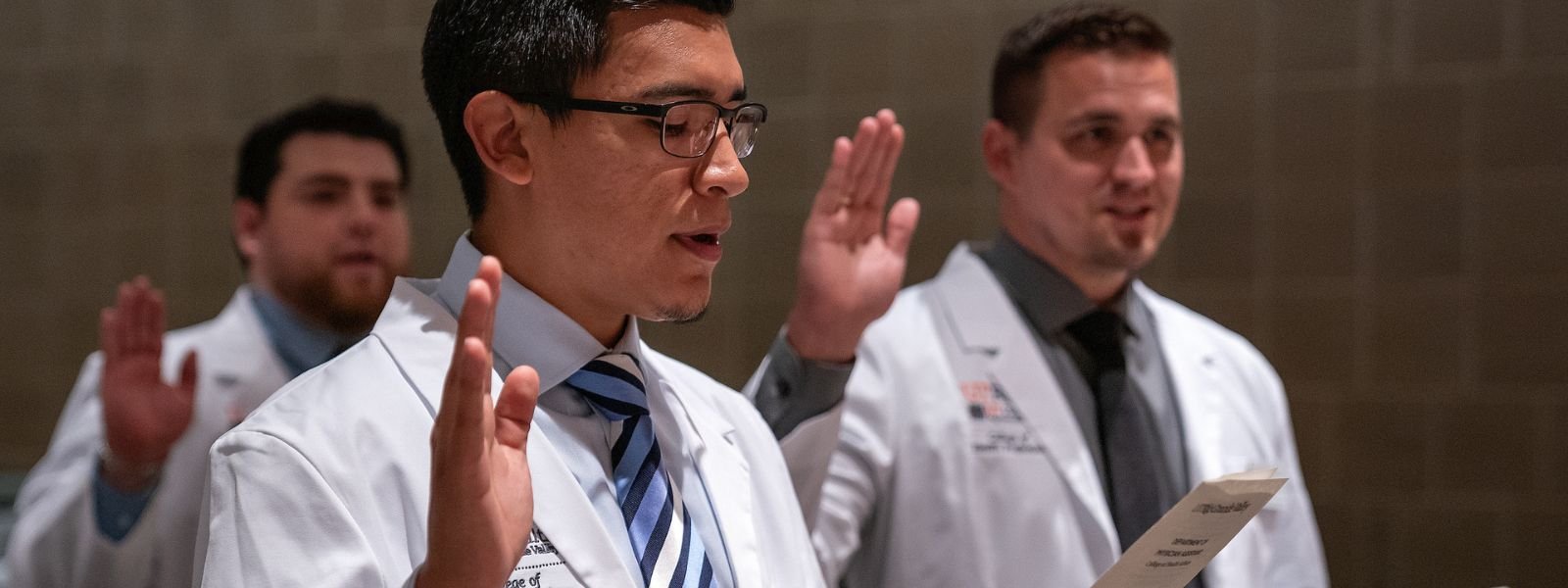Goals
1. Recruit and admit diverse qualified graduate students committed to the PA profession.
Benchmark: 50% of the matriculating class will be of a diverse background and ethnicity.
| Cohort Class | Goal Attainment |
| Class of 2017 | Met: >50% (60% disadvantaged backgrounds; 88% diverse race/ethnicity) |
| Class of 2018 | Met: >50% (53% disadvantaged backgrounds; 90% diverse race/ethnicity) |
| Class of 2019 | Met: >50% (59% disadvantaged backgrounds; 86% diverse race/ethnicity) |
| Class of 2020 | Met: >50% (78% diverse race/ethnicity) |
| Class of 2021 | Met: >50% (57% disadvantaged backgrounds; 81% diverse race/ethnicity) |
| Class of 2022 | Met: >50% (56% disadvantaged backgrounds; 85% diverse race/ethnicity) |
| Class of 2023 | Met: >50% (54% disadvantaged backgrounds; 83% diverse race/ethnicity) |
| Class of 2024 | Met: >50% (62% disadvantaged backgrounds; 73% diverse race/ethnicity) |
| Class of 2025 | Met: >50% (73% disadvantaged backgrounds; 87% diverse race/ethnicity) |
| Class of 2026 | Met: >50% (65% disadvantaged backgrounds; 83% diverse race/ethnicity) |
| Class of 2027 | Met: >50% (73% disadvantaged backgrounds; 92% diverse race/ethnicity) |
*Diverse background is determined based on race/ethnicity (non-White/Caucasian) and/or disadvantaged backgrounds (economic and/or educational).
2. Provide student clinical education opportunities in diverse settings and medically underserved areas/populations.
Benchmark: 50% of clinical rotations will occur in diverse settings and medically underserved areas/populations as demonstrated by clinical rotation assignments.
| Cohort Class | Goal Attainment |
| Class of 2017 | Met: 99.7% |
| Class of 2018 | Met: 97% |
| Class of 2019 | Met: 96% |
| Class of 2020 | Met: 90% |
| Class of 2021 | Met: 96% |
| Class of 2022 | Met: 92% |
| Class of 2023 | Met: 85% |
| Class of 2024 | Met: 67% |
| Class of 2025 | Met: 85% |
| Class of 2026 | In Progress |
Benchmark: >85% of graduates ultimately pass the PANCE.
| Cohort Class | Goal Attainment |
| Class of 2017 | Met: 100% |
| Class of 2018 | Met: 96% |
| Class of 2019 | Met: 98% |
| Class of 2020 | Met: 95% |
| Class of 2021 | Met: 98% |
| Class of 2022 | Met: 96% |
| Class of 2023 | Met: 94% |
| Class of 2024 | Unmet: 79% |
| Class of 2025 | In Progress |
Program Competencies
UTRGV Physician Assistant graduates are required to demonstrate successful mastery of the following seven (7) program competencies before graduation and entry into clinical practice. These program competencies include the effective and appropriate application of medical knowledge, interpersonal, clinical and technical skills, professional behaviors, clinical reasoning and problem-solving abilities required for PA practice within each of the following seven program competencies:
- Successfully obtain a comprehensive patient medical history.
- Perform a focused and comprehensive physical exam on patients across the lifespan (infant, child, adolescent, adult, and elderly).
- Order and correctly interpret laboratory, radiologic and other diagnostic studies.
- Demonstrate higher order critical thinking and medical decision-making skills to develop a comprehensive list of differential diagnoses.
- Formulate a management/treatment plan that incorporates evidence-based medicine and current recommendation guidelines for acute, chronic, and preventive patient encounters.
- Provide patient education on the following topics:
- Illness and disease
- Treatment options
- Health promotion and disease prevention
- Lifestyle risk factors
- Demonstrate the following interpersonal skills and professional behaviors necessary for effective communication with peers, faculty, and patients: professional responsibility, competence, maturity, and integrity.
Building Blocks
The program competencies were developed following the Physician Assistant Education Association Core Competencies for New Physician Assistant Graduates (2018) (Core Competencies for New PA Graduates). Listed below are the building blocks utilized to guide students throughout the didactic and clinical phases of the curriculum to ensure successful mastery of the required program competencies.
- Patient-Centered Practice Knowledge (PCPK)
- Society and Population Health (SPH)
- Health Literacy and Communication (HLC)
- Interprofessional Collaborative Practice and Leadership (ICPL)
- Professional and Legal Aspects of Health care (PLAHC)
- Healthcare Finance and Systems (HCFS)
1.1 Recognize normal and abnormal health (Medical Knowledge)
1.2 Discern among acute, chronic, and emerging diseases (Medical Knowledge)
1.3 Elicit and understand the stories of individual patients and apply the context of their lives (including environmental influences, cultural norms, socioeconomic factors, and beliefs) when determining healthy versus ill (Medical Knowledge; Clinical Reasoning and Problem-Solving Abilities)

